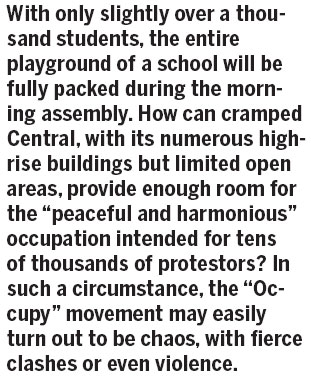Be alert to growing 'occupation' culture
Updated: 2013-04-20 06:36
By Ho Hon-Kuen(HK Edition)
|
|||||||
Years before the handover in 1997, the subordinate position of Hong Kong was obvious. Hong Kong had long been under the influence of British colonial rule with freedom, but devoid of democracy. Basically, there was no legal protection on different rights including human rights, equality and privacy rights in accordance with international standards. This marked the recent and contemporary history of Hong Kong.
Under former governor Chris Patten's tenure, various rights emerged rapidly on the political stage with the introduction of elections in the Legislative Council (LegCo), the creation of the statutory Equal Opportunities Commission and the Office of the Privacy Commissioner for Personal Data. During his rule, the Committee on the Promotion of Civic Education under the Home Affairs Bureau also promoted human rights education rapidly. Most funding applications related to human rights education were approved.
Time flies and the issue of power has been in the spotlight every so often during the past two decades, but this time the power struggle emerges with the dispute surrounding universal suffrage for the 2017 Chief Executive (CE) Election in 2017. This has stirred up a heated debate with diverse views.
The introduction of universal suffrage in the 2017 CE Election was put into the 2012 Constitutional Reform Proposals with the consent of the central government. However, the concrete practice of universal suffrage is still under discussion. Whether the would-be CE can maintain a relationship of mutual respect with the central government will be a huge issue in the future development of Hong Kong. Under the principle of "One Country, Two Systems", the universal suffrage for the CE in the HKSAR will definitely involve great complexity in terms of history, practicality and implications for future development.

As it takes only one step to fall, people in Hong Kong, on the mainland, and Chinese communities elsewhere, as well as competitors in the Western world, have sharpened their vigilance and kept a close eye on the issue. Without affection and sensibility, without understanding and tolerance, the results will only be distressing if opposing parties refuse to come to a consensus and remain rivals.
Objectively speaking, the Constitutional and Mainland Affairs Bureau has to set up a consultation timetable for implementing universal suffrage for the CE election to show its sincerity to Hong Kong people. Prior to the consultation, some scholars and pastors placed all their bets on the "Occupy Central" movement.
However, from the educational point of view, I have some reservations. The "Occupy Central" movement, with tens of thousands of protestors, is tantamount to committing an unlawful activity together. Central, which is regarded as the financial hub and the political centre, is the heart of Hong Kong. Imagine what would happen if there was an abrupt increase in heartbeat and heart pressure?
With only slightly over a thousand students, the entire playground of a school will be fully packed during the morning assembly. How can cramped Central, with its numerous high-rise buildings but limited open areas, provide enough room for the "peaceful and harmonious" occupation intended for tens of thousands of protestors? In such a circumstance, the "Occupy" movement may easily turn out to be chaos, with fierce clashes or even violence. If the movement with tens of thousands of protestors is successfully carried out, they might be arrested for their illegal act, resulting in social disorder and serious repercussions.
Advocates should have called off the "Occupy Central" movement and urged the SAR government to conduct a consultation on the arrangement for the 2017 CE Election. Instead, they persist with the movement which has become an issue not only to scholars and pastors, but also to members of political parties and labor unions, who are all ready to get involved in the "Occupy" movement through different channels. Other major world powers are also seeking opportunities to join the movement. After a chaotic occupation of Central, the movement might bring about more upheaval than peace and order to Hong Kong.
If the "Occupy Central" movement turned out to be a "success", it would never give way. This culture of "occupation" would continue to flourish. For instance, followers would occupy the church on the ground of its poor management. Similarly, students could also occupy their classrooms or even the whole campus in the name of justice and civic disobedience if academic bureaucrats rose to power in schools. It would come as no surprise that workers would occupy factories because of their unscrupulous employers. Recently, many teachers have expressed their fears about the growing culture of occupation.
The author is vice-chairman of Education Convergence.
(HK Edition 04/20/2013 page1)